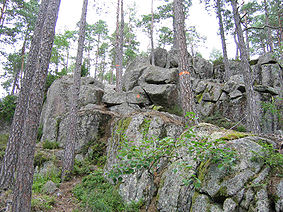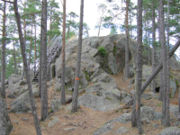
Trollkyrka
Encyclopedia

Butte
A butte is a conspicuous isolated hill with steep, often vertical sides and a small, relatively flat top; it is smaller than mesas, plateaus, and table landform tables. In some regions, such as the north central and northwestern United States, the word is used for any hill...
-like rock in the heart of the National Park of Tiveden
Tiveden
Tiveden is a Swedish forest, throughout history notorious for its wilderness and dangers; historically a hiding place for outlaws.Within it, the Tiveden National Park has a designated area of 13.5 km², a comparatively small and arguably the most inaccessible part of the forest...
, Sweden
Sweden
Sweden , officially the Kingdom of Sweden , is a Nordic country on the Scandinavian Peninsula in Northern Europe. Sweden borders with Norway and Finland and is connected to Denmark by a bridge-tunnel across the Öresund....
, which served as a pagan sacrificial ground (horgr
Hörgr
A hörgr or hearg was a type of religious building or altar possibly consisting of a heap of stones, used in Norse paganism...
, see also blót
Blót
The blót was Norse pagan sacrifice to the Norse gods and the spirits of the land. The sacrifice often took the form of a sacramental meal or feast. Related religious practices were performed by other Germanic peoples, such as the pagan Anglo-Saxons...
) for centuries after Christianity became the dominant religion in Scandinavia. It may have been used as late as the 19th century, when popular tradition still held the mountain to be off-limits for Christians.
According to Lidman (1972:52) old people used to say: "No Christian can go there. The mountains of the troll church belong to the heathen troll
Troll
A troll is a supernatural being in Norse mythology and Scandinavian folklore. In origin, the term troll was a generally negative synonym for a jötunn , a being in Norse mythology...
s. If a Christian ventures there, he will come to grief."
In fact, local tradition relates that the mountain was used not long ago for heathen rites and that anyone who was not initiated and saw it risked either to be buried in a bog in the forest or sworn into the brotherhood. These precautions clearly indicate that the rites took place as late as the period 1604–1735, which was a time when there was a penalty of death on practising such rituals. The rites are described in a folk poem documented by the folklorist Carshult (1941) when he documented the traditions on Skaga stave church
Skaga stave church
Skaga stave church is a twice rebuilt medieval stave church in Tiveden, Karlsborg Municipality, Sweden. The original chapel was built in the 1130s during the Christianization of Scandinavia, but it was demolished in 1826 to combat persistent pagan practices in the area. The locals wanted their...
. It has later been published in Karlsson (1970:62) and Lidman (1972:52).

| Kärken smyger på slingrande stig | The procession creeps on a meandering path |
| helst osedd till Trollebergen. | preferably unseen to the Troll mountains/hills. |
| Mässa skall hållas i dagarna tre, | A mass shall be held for three Numbers in Norse mythology The numbers three and nine are significant numbers in Norse mythology and paganism. Both numbers appear throughout surviving attestations of Norse paganism, in both mythology and cultic practice.... days, |
| det varde början på helgen. | this will be the beginning of the holiday. |
| Kolten är sid, så den nåder vid marken, | The frock is long, so it reaches down to the ground, |
| håsorna äro i topparna vassa, | the socks are sharply pointed, |
| hättan dras ned, så hålen för ögonen passa. | the hood is pulled down so that the holes for the eyes fit. |
| Alla är lika förutom på längda, | Everybody looks alike except for the height, |
| prelatus han räknar på mängda. | the prelate counts their number. |
| Lösen den gives i lågmälder ton, | The password is given in a low voice, |
| prelatus han bjuder tre stötar i horn. | the prelate blows three times in a horn. |
| Elden den "köllas" av nio slags ved, | The fire is kindled with nine Numbers in Norse mythology The numbers three and nine are significant numbers in Norse mythology and paganism. Both numbers appear throughout surviving attestations of Norse paganism, in both mythology and cultic practice.... kinds of wood, |
| det är gammal sed. | that is old custom. |
| Offer till andarna skänkes, | A sacrifice is offered to the spirits, |
| med blodet sig allom bestänkes. | everyone is sprinkled with the blood. |
| Det bästa till andar föräras, | The best part is gifted to spirits, |
| det som blir över skall av männerna täras. | what remains is to be consumed by the men. |
| Uti midnattens timma | In the midnight hour |
| då sjärnor beglimma, | when stars glitter, |
| prelatus han tystnaden bjuder | the prelate asks for silence |
| och männerna alla det lyder. | and this is obeyed by all the men. |
| De falla till markone ner, | They fall down onto the ground, |
| prelatus han bistert mot rymderna ser. | the prelate looks grimly at the heavens. |
| Och svärjan och formlar i dälderna skallar | And incantations and summons echo in the dells |
| prelatus han kallar på andar. | the prelate is summoning spirits. |
| Allom de fick på sitt spörje ett svar, | Everyone received an answer to their question, |
| ingen av androm fick då höra varom det var. | no one heard from another man what the answer was. |

